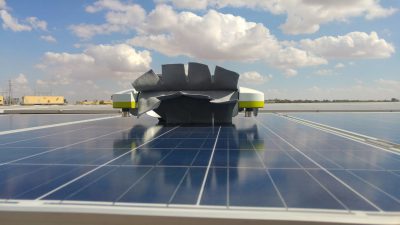 Want an investment scoop on the Middle East? Read our interview with clean tech reporter, Michael Kanellos.
Want an investment scoop on the Middle East? Read our interview with clean tech reporter, Michael Kanellos.
Michael Kanellos, editor-in-chief at the popular clean tech news blog Greentech Media operates on a level that surpasses even the most active of us bloggers. I met Mike in Finland a couple of months ago on a clean tech media tour joined by other bloggers like TreeHugger’s Ask Pablo, and Lisa Hymas, a senior editor and founder at Grist.
Before most of us had the chance to shower and stumble our way down to the lobby for breakfast, Michael had already scoured the city around us, whipped up a few blog posts, had eaten, sauna-ed, and later –– by the time we got around to meeting the Finnish cleantech companies on our tour –– had in fact already met several of them earlier at various conferences on his travels.
Michael lives, breathes and sleeps clean tech news: Travelling the world far and wide for stories, we interviewed him to get a western point of view on clean technology trends and developments in the Middle East. Since he’s always forgetting his Twitter account, he says (but here it is) – it’s best to follow his work through the site www.greentechmedia.com.
Our interview:
1. Michael –– You travel the world looking for clean tech stories. What 3 countries, besides your native US, do you find most attractive right now?
Right now, the three most interesting countries are China, Israel and Northern Europe (Scandanavia, Ireland, Scotland).
China because of the size of the domestic market, the growth, and the increasing sophistication of the local manufacturers. Suntech has gone from an asterisk in solar in five years to the largest manufacturer in the world. And their solar panels aren’t popular because they are the cheapest. It has fairly strong technology.
Israel remains interesting because of its historical strengths in concocting new companies and technologies and commercializing them. The domestic water know how will also play a key role in the future.
Northern Europe is the novel one here. Europe only played a minor role in the Internet and IT world. However, many of the universities have finally begun to figure out how to mint start-ups. The region also has a long history in energy efficiency and alternative energy—what were cottage industries are becoming global. The question is whether these companies can attract US investors and market globally. It has been a historical challenge.
2. Keeping your pulse on clean tech industry, what are the 5 hottest growth areas right now?
i. Building management and architecture. Buildings and the appliances inside of them consume 39 percent of the world’s energy and most of the energy is used in an asinine fashion: lights stay on even after everyone has left, few offices have automatic dimming, and air conditioners often run in tandem with heaters.
Automating all of the things around us will curb power immensely.
ii. Electric cars are number two—they represent the biggest change in transportation since the highway.
iii. Energy storage. Right now, wind farms have to spill power if there is no one around to take it. Power plants spend trillions on figuring out ways to produce power and get it consumed right away. Every investor is looking for a holy grail technology or company in storage.
iv. The fourth big trend is solar. If you could harness all of the power hitting the earth in a two hour period and convert it to liquid fuel or electricity, you’d have enough energy for all of the world’s needs in a year. It is a huge untapped resource and although progress can be slow, the potential is immense.
v. Demand response. This is an extension of building management to a certain extent. Essentially, utilities or power providers want to gain control over certain resources to make sure power gets used where it will be needed and not wasted where it is currently leaking. Think of this as an orchestration layer above building management. With demand response, electric cars can be squeezed onto the grid without massive capital investments.
3. How will this projected “double dip” in the world’s economy affect the development of clean technology solutions? Will it weed the good from the bad, make consumers more energy efficient?
Yes, but I think the market will continue. The BP disaster, the ongoing droughts in many parts of the world, the crazy global weather, the ongoing war in Iraq, China’s quest for more resources. The average westerner is once again beginning to see the connection between his or her lifestyle and resources.
4. If a young entrepreneur wanted to pitch you a story about their technology, what really “buys” your attention?
A good story. Just talk about your technology and its implications.
5. Any thoughts on the Middle East? What would you tell investors about the region’s emerging markets?
Israel remains the only country in the region that will produce technologies. The rest of the MENA region will be buyers, i.e. they will install desalination plants and solar thermal plants or they will recruit companies at a high price to locate at least token manufacturing centers.
The rest of the region does not have the same technology culture and the commercial/industrial infrastructure to exploit it. That said, the best technologists out of MENA, and there are many, will ultimately come to the west and make it big.
As a result, it’s a bifurcated region. Israel will export but few opportunities to import products there exist. The opposite is true for the rest of the region. Desertec is an exception. That is more of a real estate play.
Thus, if I were an investor, I’d hang out at Weizmann or Technion and look for interesting companies to invest in.
I’d also get a good land use attorney to scout out plots of land and grid connections in North Africa.
6. After your trip of Finland, is there any one tech/company that left a lasting impression?
The people who make the underground data center [in a bomb shelter] were quite interesting. Half of the powers in data centers get consumed by air conditioners and they’ve figured out a way to cut that way back.
Thank you, Michael!
Read the first post from Michael’s reporter’s notebook, while in Finland.




Comments are closed.